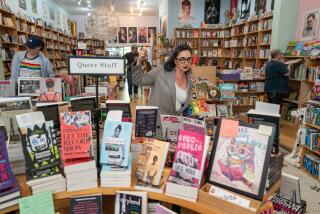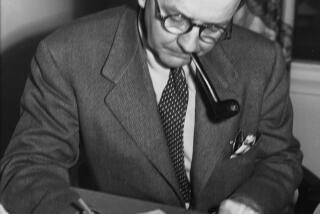Coming Home, Coming Out : Poet and Native Son Frank Bidart Creates Stir in His Return to Bakersfield
- Share via
BAKERSFIELD — Nearly 40 years after he left behind his father’s potato fields to become one of America’s most-acclaimed poets, Frank Bidart came home to Bakersfield last weekend to make peace with the past.
His poetry reading Saturday night was a chance for this agricultural valley to acknowledge at last the extraordinary gifts of one of its native sons. And it was a chance for Bidart, 57, a Wellesley College professor celebrated as a poet’s poet, to find a different Bakersfield from the one he left, one that is open to his work.
But his homecoming, like one of his complex, layered poems, was a bittersweet affair that honored Bidart in a way few poets have been honored, but also publicly revealed his homosexuality to an extended family who knew him only by his nickname “Pinon,” another one of the little Bidart boys.
“It’s one thing to declare my homosexuality in a poem and it’s another to have it in your hometown paper,” he said before the reading. “It’s been painful, but on the other hand, it’s actually better. Now I don’t feel like this event is a fraud any more.”
His tiny fan club here had gone to great lengths to make the event special, even renting a billboard along one of the town’s main drags, proclaiming “Frank Bidart Is Coming Home.” But a few days before the reading, the billboard’s message was drowned out by a Bakersfield Californian story headlined “Frank Bidart returns to town he hated.”
The headline badly misrepresented his conflicted feeling toward a town that both nurtured and stifled him, he said, but even more awkward were the several paragraphs midway through the story that dealt with his sexuality.
While Bidart’s friends and colleagues in Boston and his readers across the country have long known that he is gay, it came as something of a shock to several older members of his wealthy and prominent farming family.
“If I was giving a reading anywhere else, I’m not sure I would have been asked the question. But it was the hometown paper and the reporter thought my homosexuality was relevant to why I left Bakersfield, so I answered it.
“In a way, I ‘outed’ myself. I could have told the reporter no, but I didn’t say that. . . . If someone isn’t going to come to my reading now because I’m gay, I don’t give a damn.”
While this city’s perspective surely has broadened over the years with newcomers from Southern and Northern California taking up residence, it is still a stridently conservative place where private property rights are a second religion and militia groups have found a toehold.
Locals never have had a problem paying homage to Buck Owens and Merle Haggard who changed country and western music with their “Bakersfield Sound.” But the town has had a harder time embracing and keeping its literary talent.
For a child like Bidart growing up in post-World War II Bakersfield, the choices seemed meager. Ever since his grandfather, John Bidart, immigrated to California from the French Pyrenees in the late 1880s, no man in the family had forsaken the farm. A history of Kern County recorded John Bidart in 1914 as “one of the largest sheep men” in the area with a 400-acre alfalfa and corn farm.
The grandfather died in the flu epidemic of 1918, but his seven children and their children carried on, adding more crops and more acreage until today Bidart Brothers is one of the largest diversified farming operations in a county known for its agriculture.
As a young boy, Bidart saw the disapproval that the extended clan, deeply Catholic and private, directed at his parents. His father, a big handsome man who was the family’s black sheep, did not bother to hide his drinking and carousing, and the Bidarts divorced when Frank was 5.
If Bidart knew he was different from the other boys, a “sissy” and a “momma’s boy” in his words, it wasn’t something he felt comfortable sharing with anyone in the family. Both of his parents would die not knowing the truth.
“I knew from the age of 5 that I was gay. It terrified me that I was interested in men’s bodies. It was a big, terrible secret. I felt I was the only person on earth with that feeling.”
*
He also discovered early on his love for the performing arts, and in the absence of live theater or opera, he devoured movies as a kid. As a student at the town’s Garces Memorial High School, he took his first stab at writing poetry. After graduating from UC Riverside, he went to Harvard University for graduate studies, a departure effected both by the pull of cosmopolitan academia and the push of his own secret knowledge of his homosexuality.
At Harvard, he came under the spell of professor Robert Lowell, who was transforming American literature with his so-called confessional family poems.
“I was incredibly lucky,” Bidart said. “I met Lowell at a time in his life where he needed someone like me, someone who was free and wasn’t a yes-man and could act as a sounding board for his work in progress.”
After Bidart grew close to Lowell, and to Lowell’s wife and fellow poet Elizabeth Bishop, he decided to reveal his secret. “I remember I had my heart in my mouth when I told Lowell and his wife that I was gay. I thought they would recoil but they laughed and said, ‘We certainly assumed that you were.’ ”
Already, Bidart was deep into his own grave work about his father and mother, his “argument with the past.” His first collection, “The Golden State,” was published in 1973. Its poems confronted his spiritual wounds inflicted by a father completely helpless to his own demons--an alcoholic and a skirt chaser but also a man who did not pretend to be anything but what he was.
In a poem in which he addresses his dead father by his nickname, Shank, Bidart celebrates his father’s honesty even as he must contend with its shambles. “To see my father lying in pink velvet, a rosary twined around his hands, rouged, lipsticked, his skin marble,” he writes. “Oh Shank, don’t turn into the lies of mere, neat poetry.”
His poetry over the last 20 years--most of it less autobiographical and more meditative, in the voice of tragic characters such as dancer Vaslav Nijinsky--has won virtually every award short of a Pulitzer and a Nobel Prize. Seamus Heaney, the Nobel Prize winner, has called Bidart “one of the boulders” of modern poetry.
But back in the San Joaquin Valley of his birth, recognition was grudging. For a long time, the main library in Kern County carried not a single volume of his work, and when an anthology celebrating valley writers, “Highway 99,” came out last year, Bidart was nowhere to be found in its pages.
Enter Lee McCarthy, a local poet and former wife of novelist Cormac McCarthy, who decided to answer the snub by inviting Bidart to his first reading ever in the valley. McCarthy dug deep into her own pockets to rent the billboard hyping the reading.
“I’m probably the only poet in America who’s had a billboard,” Bidart said with a chuckle.
Then the Bakersfield Californian story came out. Several of the younger generation of Bidarts, who had long known that Frank was gay, winced at the thought of his elderly aunts and other members of the conservative community reading the piece.
“Frank has always been careful not to share his works with the older generation,” said his cousin Leonard Bidart. “So the story did cause some discomfort.”
*
Californian writer Joan Swenson said that wasn’t her intent. “His being gay came up naturally in the conversation. I wasn’t trying to hurt him or his family or the Basque community. This is his hometown. There are people who knew this about him. So on one hand, if I don’t put it in, it looks like I’m either stupid or trying to protect him, and from what?”
Bidart said that noting his homosexuality in the story wouldn’t have troubled him, but it came to take up several paragraphs. “I didn’t mind her mentioning it but I’m not sure such a strong emphasis was germane to the piece. And the headline didn’t help.”
McCarthy feared the story would sabotage the reading, and her efforts to erase the years of neglect would be for naught. But Saturday night, the tall, balding Bidart strode into a lecture hall at Bakersfield College that was nearly full of admirers. And he made no concessions, reading a challenging 45-minute poem right out of Greek myth about a king and his daughter and incest.
“People were incredibly nice to me. They were very warm and made a point of saying how proud of me they were,” he said. “In a funny way, I think the story and the controversy made them feel comfortable about asserting their affection and respect. It was extraordinary.”
More to Read
Sign up for our Book Club newsletter
Get the latest news, events and more from the Los Angeles Times Book Club, and help us get L.A. reading and talking.
You may occasionally receive promotional content from the Los Angeles Times.






